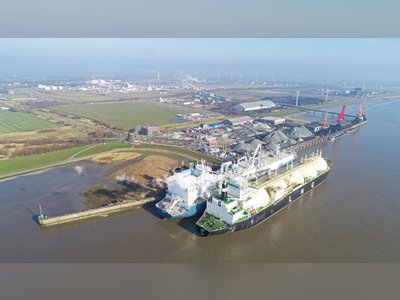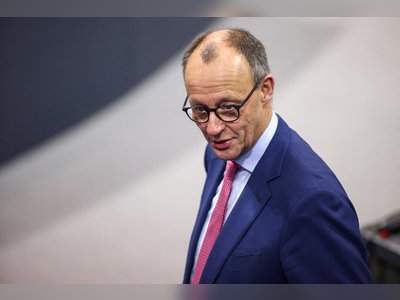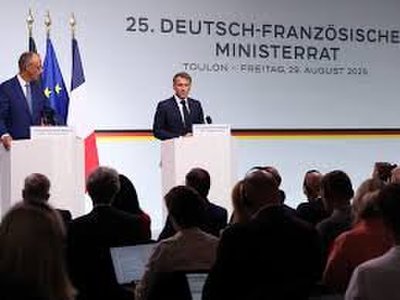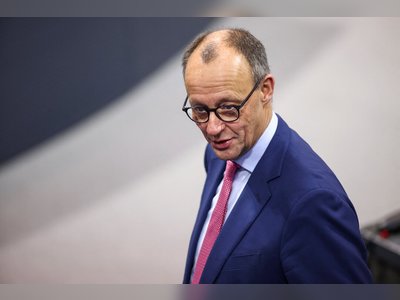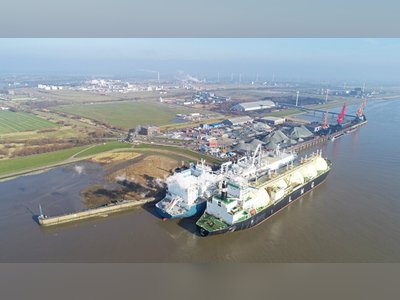
AfD Attains Remarkable Lead in Thüringen Elections
Preliminary results indicate Alternative für Deutschland (AfD) could secure over 40% of the vote as political reactions emerge.
Preliminary results from the recent elections in Thüringen signal a significant lead for the Alternative für Deutschland (AfD), with approximately 41.0% of votes counted from 2,503 of the 2,994 election districts.
Björn Höcke, the state chairman of the AfD, has taken a prominent role in the political discourse, actively engaging in discussions to influence potential coalition negotiations in Berlin.
Meanwhile, Christian Hirte, the deputy chairman of the Christian Democratic Union (CDU) in Thüringen, labeled the AfD's electoral success as a ‘warning signal for the whole country’.
The Thüringen Office for the Protection of the Constitution has designated the AfD as a right-wing extremist party, emphasizing the controversial nature of its political platform.
Following the AfD in the preliminary count, the CDU secured 18.2% of the votes, while the Left Party received 14.2%.
The Bündnis Sahra Wagenknecht (BSW) garnered 9.2%, and the Social Democratic Party (SPD) trailed at 8.3%.
Notably, other parties failed to clear the 5% electoral threshold necessary for representation in parliament.
Hirte attributed the AfD's strong performance to the actions of the governing coalition in Berlin, claiming that their decisions have served to double the AfD’s electoral success.
He called for all political factions to channel their efforts toward effective governance from a political center.
In contrast, Georg Maier, chairman of the SPD in Thüringen, expressed disappointment in the electoral outcome, labeling it a ‘bitter defeat’.
Maier suggested that a segment of voters appeared to hold the SPD accountable for the instability within the coalition government, with the campaign heavily centered on migration issues, overshadowing critical topics such as pensions and wages.
Amidst these electoral developments, Höcke has publicly rejected the notion of entering into a coalition with the CDU as a junior partner, demanding a ‘180-degree turnaround from the CDU regarding the Merkel years’.
He has called for a departure from policies related to energy transition and multiculturalism, stipulating that the CDU would only be considered for coalition discussions if it accommodates these requirements.
Concurrently, AfD leaders Alice Weidel and Tino Chrupalla have expressed interest in forming a coalition with the Union, extending an invitation for collaboration.
Furthermore, Chrupalla reportedly contemplated a visit to Afghanistan following the elections, aiming to present an alternative perspective on the regional situation; however, this idea was met with caution from German security agencies, resulting in the withdrawal of his plans.
Data also reflect a significant realignment in voter support: the CDU/CSU lost nearly one million voters to the AfD, while the Left Party attracted approximately 600,000 votes away from the Greens.
The AfD has reported a gain of 4.38 million votes compared to the preceding election, marking it as the party with the largest net growth.
In contrast, the SPD experienced a loss exceeding 3 million voters, primarily shifting to the CDU, showcasing the shifting dynamics within the German political landscape following these recent elections.
Björn Höcke, the state chairman of the AfD, has taken a prominent role in the political discourse, actively engaging in discussions to influence potential coalition negotiations in Berlin.
Meanwhile, Christian Hirte, the deputy chairman of the Christian Democratic Union (CDU) in Thüringen, labeled the AfD's electoral success as a ‘warning signal for the whole country’.
The Thüringen Office for the Protection of the Constitution has designated the AfD as a right-wing extremist party, emphasizing the controversial nature of its political platform.
Following the AfD in the preliminary count, the CDU secured 18.2% of the votes, while the Left Party received 14.2%.
The Bündnis Sahra Wagenknecht (BSW) garnered 9.2%, and the Social Democratic Party (SPD) trailed at 8.3%.
Notably, other parties failed to clear the 5% electoral threshold necessary for representation in parliament.
Hirte attributed the AfD's strong performance to the actions of the governing coalition in Berlin, claiming that their decisions have served to double the AfD’s electoral success.
He called for all political factions to channel their efforts toward effective governance from a political center.
In contrast, Georg Maier, chairman of the SPD in Thüringen, expressed disappointment in the electoral outcome, labeling it a ‘bitter defeat’.
Maier suggested that a segment of voters appeared to hold the SPD accountable for the instability within the coalition government, with the campaign heavily centered on migration issues, overshadowing critical topics such as pensions and wages.
Amidst these electoral developments, Höcke has publicly rejected the notion of entering into a coalition with the CDU as a junior partner, demanding a ‘180-degree turnaround from the CDU regarding the Merkel years’.
He has called for a departure from policies related to energy transition and multiculturalism, stipulating that the CDU would only be considered for coalition discussions if it accommodates these requirements.
Concurrently, AfD leaders Alice Weidel and Tino Chrupalla have expressed interest in forming a coalition with the Union, extending an invitation for collaboration.
Furthermore, Chrupalla reportedly contemplated a visit to Afghanistan following the elections, aiming to present an alternative perspective on the regional situation; however, this idea was met with caution from German security agencies, resulting in the withdrawal of his plans.
Data also reflect a significant realignment in voter support: the CDU/CSU lost nearly one million voters to the AfD, while the Left Party attracted approximately 600,000 votes away from the Greens.
The AfD has reported a gain of 4.38 million votes compared to the preceding election, marking it as the party with the largest net growth.
In contrast, the SPD experienced a loss exceeding 3 million voters, primarily shifting to the CDU, showcasing the shifting dynamics within the German political landscape following these recent elections.
AI Disclaimer: An advanced artificial intelligence (AI) system generated the content of this page on its own. This innovative technology conducts extensive research from a variety of reliable sources, performs rigorous fact-checking and verification, cleans up and balances biased or manipulated content, and presents a minimal factual summary that is just enough yet essential for you to function as an informed and educated citizen. Please keep in mind, however, that this system is an evolving technology, and as a result, the article may contain accidental inaccuracies or errors. We urge you to help us improve our site by reporting any inaccuracies you find using the "Contact Us" link at the bottom of this page. Your helpful feedback helps us improve our system and deliver more precise content. When you find an article of interest here, please look for the full and extensive coverage of this topic in traditional news sources, as they are written by professional journalists that we try to support, not replace. We appreciate your understanding and assistance.



